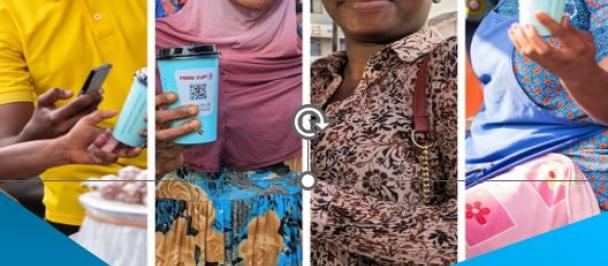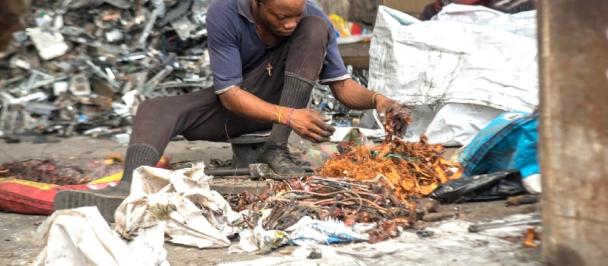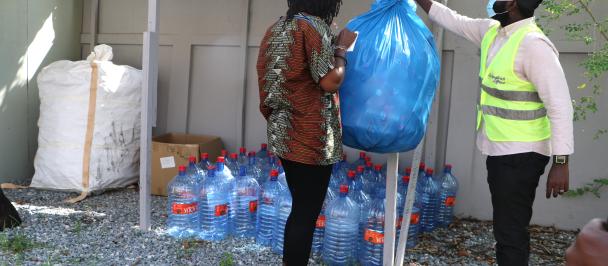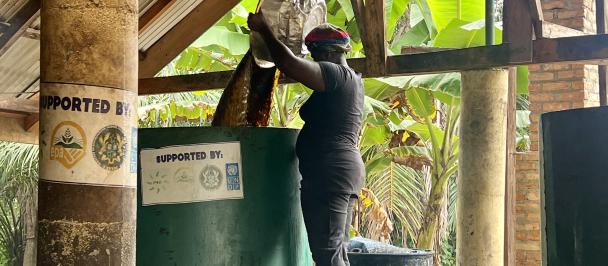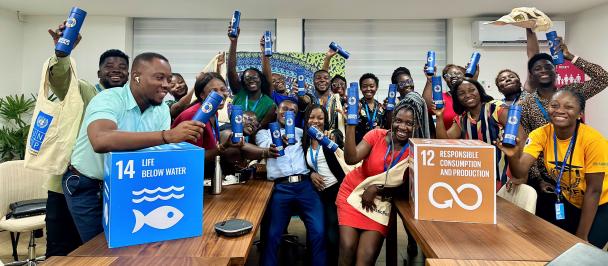Multi-stakeholder Waste Recovery Initiative
Background and objectives
As with many urbanizing economies, Ghana's municipalities face significant challenges with solid waste management. There is a need for a new way to think about the issue of waste – not just from a management point of view but from the perspective of re-use at multiple levels. However, existing approaches are nowhere near being able to address the scale of the challenge, and waste recovery and use offers various benefits. This involves thinking about wastes as Materials in Transition, which is the case so long as there exists an operating connection between the waste generator and the second-life user.
Under-utilized and un-managed waste materials pose serious risk to the environment and human health, with the greatest negative impact felt by the most vulnerable in society. Alternatively, when connections – pathways and avenues – are created and known, waste materials can journey from where they are not needed, to where there is a need, creating economies and livelihoods. Waste materials can be used in replacement for new materials, preserving our natural resources and slowing climate change. The activity of assisting waste on its journey to a valuable resource can create millions of good jobs across society, especially for marginalized citizens.
It is against this background that UNDP facilitated a multi-stakeholder co-designing process to establish Ghana’s largest space for connecting ideas, people and resources for waste recovery. The Waste Recovery Platform has the objective to connect key stakeholders in the waste management value chain to promote waste recovery in a larger circular economy context. It builds on two key fundamentals: a) the journey towards circular economy requires collaborative problem-solving, engagement and partnerships across all stakeholders; b) for a circular economy to thrive, the availability of data and information is essential.
The Waste Recovery Platform has 4 dimensions:
- A physical convening mechanism that brings together all the stakeholders on a periodic basis to connect, discuss issues of common interest and forge partnerships for effective waste management;
- A digital platform that includes a number of tools (e.g. waste resource map, compendium of technologies etc.) to provides real time information/data on waste management and facilitate material exchange;
- A promoter of innovation with catalytic support for innovative R&D and businesses that demonstrate, contribute knowledge and raise awareness on opportunities for waste recovery or minimization (e.g. ‘Waste’ Recovery Innovation Challenge);
- A communication dimension that creates awareness and build knowledge for the general behavioral change needed to make waste recovery systems effective.
The Platform is expected to promote circular economy by:
- Connecting stakeholders and improving information flows for strengthened coordination and collaboration;
- Providing a space for engaging citizens to Reduce, Reuse, Recycle;
- Making available scientific-based data and tools for planning and investment;
- Facilitating stronger connections between the formal and informal sectors;
- Facilitating new types of collaborations between research and private sector for the development and testing of innovative solutions;
- Demonstrating the economic, social and environmental benefits of business models for sustainable waste recovery, triggering further testing of technologies and innovative solutions and their adoption at scale.
Progress and key achievements (as of July 2020)
Below is a summary of achievements so far under each dimension of the platform.
1. Physical convening mechanism
- The Platform has led discussions that contributed to the development of the National Plastic Management Policy (e.g. see article).
- Its convening mechanism has been utilized by partners to facilitate stakeholder consultations for their operations, e.g. the World Economic Forum for the initiation of Ghana’s chapter of the Global Plastic Action Partnership - GPAP (see article), DFID and Aker Energy.
- Its convening mechanism has again been utilized to discuss the impact of COVID-19 in the waste management sector, agree on actions to address these challenges and mobilize stakeholders to support their implementation (see article).
- New partnerships have been created, e.g. Total and Voltic/Coca Cola have engaged a local start-up for collection of plastic waste with involvement of informal sector.
- Private sector’s confidence in investing in waste recovery is increasing thanks to the availability of the Platform to address concerns, provide data and potential partners with experience on the market.
2. Digital platform
- The development of the digital components of the Platform (website, waste resource map, “Uber for Waste” mobile app) is at an advanced stage. Ghana Statistical Service has expressed interest in mainstreaming this in their data collection system.
3. Innovation
- In partnership with the Netherlands Embassy, UNDP conducted the ‘Waste’ Recovery Innovation Challenge to provide technical and financial support to 10 innovative business, research and advocacy projects to demonstrate resource recovery opportunities in Ghana (see article).
- With support from the Coca-Cola Foundation, a second edition of the ‘Waste’ Recovery Innovation Challenge has been launched to provide technical and financial support to business solutions that will promote and/or test innovative strategies for plastic waste recovery and management in Ghana.
4. Advocacy and awareness creation
- A communication strategy has been developed and, through information shared during the Platform’s activities, there has been increased awareness on opportunities for waste recovery in Ghana.
- A COVID-19 Communication Plan has been developed to: project the important role of waste collectors in covid-19 response; mobilize resources to provide PPEs to waste collectors; create awareness on the safe use and disposal of face masks, tissues etc.; and sensitize communities on how they can manage waste efficiently in the midst of COVID-19.
Finance
The Waste Recovery Platform is not a project, but an initiative. As such, it has multiple sources of funding as the situation evolves. The Platform was established with seed funding from UNDP’s Country Investment Facility (USD 500,000). The first edition of the Waste Recovery Innovation Challenge was co-funded by the Embassy of the Netherlands (USD 100,000). 2020 activities are supported by a partnership with the Coca Cola Foundation.
Documents
To have a broad overview about the Platform (where it comes from, what it is about, what has been achieved so far, what are the plans for 2020), see this presentation.
Innovation Challenge (2020)
Kindly visit here for the 2nd call for concept notes from the private sector on the ‘Waste’ Recovery Innovation Challenge (WRIC).
Description – background and objective
As with many urbanizing economies, Ghana's municipalities face significant challenges with solid waste management. There is a need for a new way to think about the issue of waste – not just from a management point of view but from the perspective of re-use at multiple levels as existing approaches are nowhere near being able to address the scale of the challenge and waste recovery and use offers various benefits. This involves thinking about wastes as Materials in Transition, which is the case so long as there exists an operating connection between the waste generator and the second-life user.
Under-utilized and un-managed waste materials pose serious risk to the environment and human health, with the greatest negative impact felt by the most vulnerable in society. Alternatively, when connections – pathways and avenues – are created and known, waste materials can journey from where they are not needed, to where there is a need, creating economies and livelihoods. Waste materials can be used in replacement for new materials, preserving our natural resources and slowing climate change. The activity of assisting waste on its journey to a valuable resource can create millions of good jobs across society, especially for marginalized citizens.
It is against this background that UNDP is facilitating the creation of a digitally enabled multi-stakeholder platform to connect key stakeholders with data and technological solutions for resource recovery.
Objectives:
- Facilitate more cost-effective and transparent access to ready data for evidenced-based planning by policy makers on sanitation management;
- Enhance access to knowledge on best available technologies on waste valorization;
- Make it easier to find/link to solution providers and off-takers;
- Stimulate further research and innovation on waste valorization in relation to emerging demand and options;
- Create an online market place for waste resource exchange
- Build capacity of key personnel (local government, private sector, NGOs and Academia) to enhance sanitation management particularly at the decentralized level.
Expected Impact
- Demonstrate the potential economies of scale for waste recovery businesses whilst meeting social and environmental needs. This could be a basis for scaled up public and private investments in waste recovery;
- The data and innovative tools made available by the platform can help to increase investor confidence in the waste sector through the ability to make scientific-based economic decisions and bring in needed resources necessary for scaling-up;
- Create an online market for recycled products and /or export/import of valuable waste streams, thus helping other initiatives to be more viable/scaleup;
- Facilitate stronger connections between the formal and informal sectors through innovative apps but also provides the opportunity for the informal sector to formalize and scale -up;
- Provide a space for engaging citizens to Reduce, Reuse, Recycle and thus be part of the circular economy.
Accomplishments – progress and key achievements (as of January 2019)
- Through the initiative, Ghana now has a platform that convenes on a periodic basis, all key stakeholders in the waste management value chain to discuss issues of common interest to enhance their operations and explore opportunities for partnerships. This functional platform has improved coordination and communication among key stakeholders on sanitation management.
- Through the platform, some key stakeholders have been able to form new partnerships for waste recovery in Ghana. For example; two active members, namely Voltic and Coliba (a local start-up collecting recyclables), have partnered on a new initiative called IRecycle, to establish plastic collection centres in partnership with Total Ghana to enhance plastic waste recovery.
- There has been increased awareness on opportunities for waste recovery in Ghana through information shared on the initiative’s activities.
- Increasing investor confidence in the waste management sector due to the availability of the platform to address concerns, provide updated data and provide potential partners with experience on the market.

 Locations
Locations